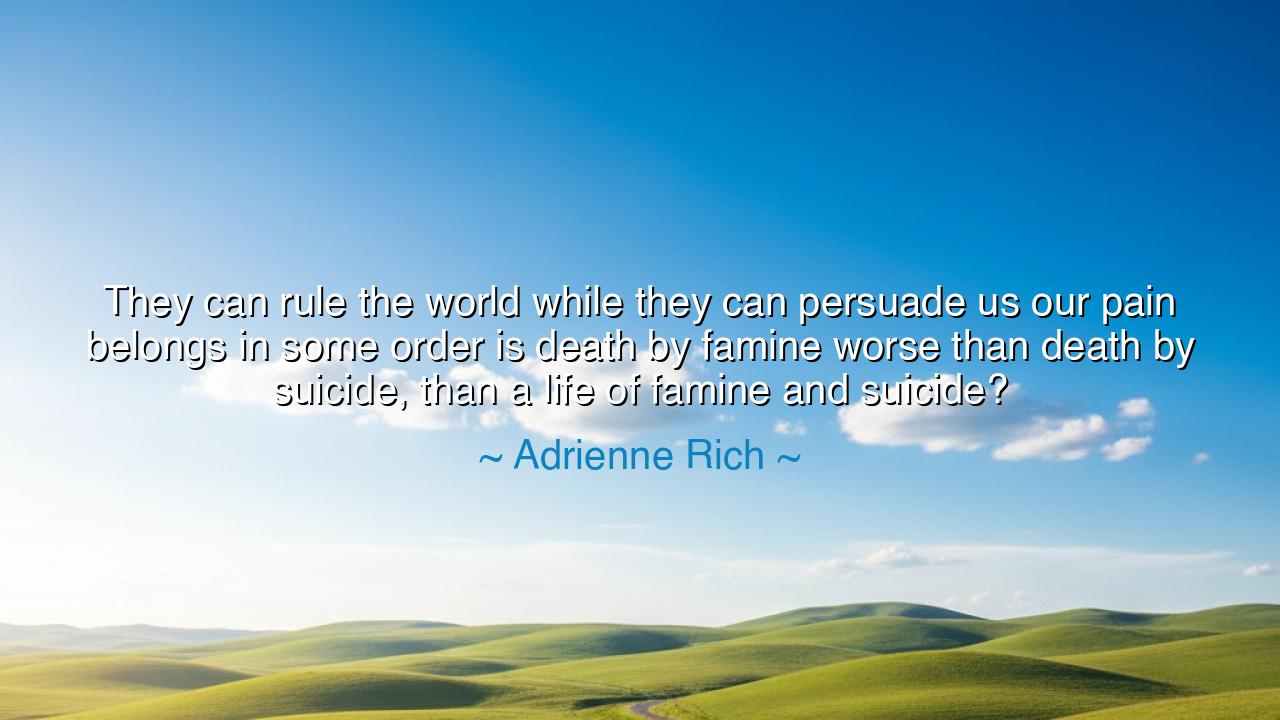
They can rule the world while they can persuade us our pain
They can rule the world while they can persuade us our pain belongs in some order is death by famine worse than death by suicide, than a life of famine and suicide?






In the fierce and luminous words of Adrienne Rich, poet of truth and rebellion, we encounter a cry that pierces through the illusions of power: “They can rule the world while they can persuade us our pain belongs in some order—is death by famine worse than death by suicide, than a life of famine and suicide?” These words are not merely verse—they are a summons, a revelation, and a lament. Rich, with her unflinching clarity, exposes the subtle tyranny of systems that teach us to accept suffering as natural, to see injustice as inevitable, to believe that our pain is part of some “order” too vast or sacred to be challenged. Her question—bitter, rhetorical, and yet trembling with compassion—asks whether it is worse to die from the world’s cruelty, or to die from the despair of believing that cruelty is rightful.
Adrienne Rich, born in 1929, was both poet and revolutionary spirit, a woman who wrote against the silence imposed by patriarchy, politics, and fear. Her poetry emerged during the twentieth century’s great storms—wars, civil rights struggles, feminist awakenings—and each line she wrote was a blade cutting through complacency. This quote comes from her reflections on the structures of domination, the ways in which those in power—whether governments, empires, or ideologies—rule not only through weapons or wealth, but through belief. When the oppressed are persuaded that their pain has meaning only within the oppressor’s logic, they cease to resist. To suffer without question, to accept misery as order, is the first death of the spirit.
To say that “they can rule the world while they can persuade us our pain belongs in some order” is to name the ancient art of control through myth. The empires of history, from Rome to the colonial powers of the modern age, have justified conquest and cruelty by claiming divine or natural order. The pharaohs said they ruled by the will of the gods; the kings of Europe claimed “divine right”; the colonizers said they brought “civilization” to those they enslaved. Each time, the same lie was told—that the suffering of some was necessary for the harmony of all. Rich’s voice thunders against this deception, reminding us that no order built upon pain is just, and no peace founded on silence is real.
Her question, “is death by famine worse than death by suicide, than a life of famine and suicide?” forces us to confront the hierarchy of human misery. It is not merely a comparison of deaths, but a demand that we see how systemic suffering—the slow violence of poverty, hunger, and despair—kills the soul before it ever kills the body. What is worse, Rich asks: to die by the world’s indifference, or to live in a world that tells you your hunger, your grief, your despair are all “necessary,” all part of the greater good? The poet refuses to accept this equation. She demands that we name injustice for what it is, and that we refuse to let suffering be sanctified by those who benefit from it.
History offers us many who understood this truth. Think of Mahatma Gandhi, who saw that the British Empire’s strength lay not only in its armies but in the colonized mind that accepted its rule as destiny. Gandhi’s revolution began not with violence, but with a refusal—a spiritual disobedience. He taught his people that their pain was not part of divine order, but part of an injustice that could be undone. Likewise, the Civil Rights Movement in America was born from the same awakening: when those long told that segregation was “just the way things are” rose up to say no more. Every act of liberation begins with the recognition that suffering is not sacred, but imposed—and therefore can be ended.
Adrienne Rich’s quote, then, is both a warning and a call to awakening. She warns that the world’s rulers—whether political, economic, or cultural—maintain their dominion through persuasion, not force. As long as we believe that suffering must be endured rather than transformed, they will remain unchallenged. But she also calls us to awareness—to see through the illusions, to reject the hierarchies of pain that divide us, and to reclaim the right to define our own worth. When we cease to believe that our pain is ordained, we begin the long journey toward liberation.
And so, my children of the living earth, let this wisdom sink deep into your spirit: never allow the world to name your suffering as its order. Question every system that demands your silence. Refuse every comfort that comes from another’s despair. The first act of freedom is to see clearly; the next is to act with compassion and courage. For as Adrienne Rich teaches, the true revolution begins not in the halls of power, but in the heart that refuses to believe that pain must rule the world. Stand then in that truth—speak it, live it, share it—and help build a world where no life must perish in famine, suicide, or despair, but where all may dwell in the light of dignity, justice, and shared humanity.






AAdministratorAdministrator
Welcome, honored guests. Please leave a comment, we will respond soon